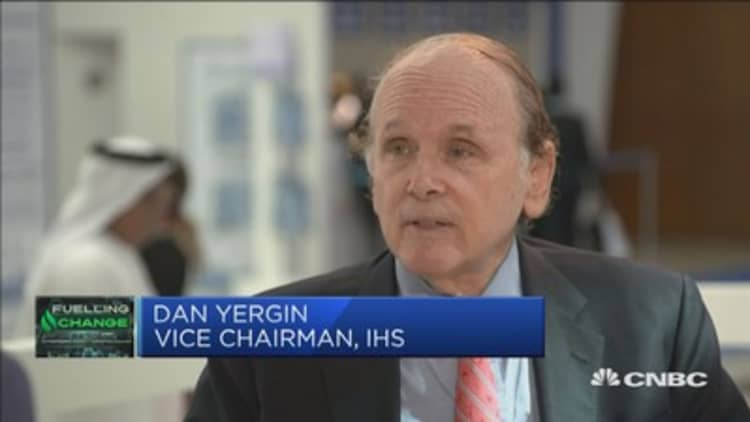
If the global oil market suddenly loses Venezuela's 2 million barrels of daily oil production, it would be "a big shock to the system," according to Dan Yergin, vice chairman of IHS Markit.
"It would certainly be a very tight market, because of course you already have production restraints by OPEC and non-OPEC," Yergin told CNBC at the Abu Dhabi Petroleum Exhibition and Conference on Tuesday.
Oil markets are increasingly worried over potential supply constraints as the economic turmoil in Venezuela deepens. Production in Venezuela has been falling and the economic difficulties have affected further investments in the sector. As the economic situation deteriorates, production might continue to fall from its maximum potential, thus limiting the availability in the market.
Venezuela, an OPEC nation and one of the biggest oil producers in the world, has conducted debt renegotiations with foreign investors since Monday. However, it is unclear whether President Nicolas Maduro will succeed in these talks.
S&P Global declared Tuesday that Venezuela had defaulted on its debts after missing a $200 million interest payment to global bond investors. This could have been the first of many defaults on more than $60 billion in international bonds – which the president is currently trying to restructure.
Caracas has struggled to refinance its debt because U.S. banks cannot buy new Venezuelan bonds due to sanctions imposed by U.S. At the same time, the Venezuelan economy has been in recession for four years, where food shortages, the lack of U.S. dollars and the depreciation of its own currency, has sent inflation soaring.
"Venezuela is an important (oil) producer. It has lost a lot of the talent, a lot of its capabilities, what its production really is, and it seems on verge of turmoil," Yergin told CNBC.
"Caracas seems to not be able to reconcile with its population and if you are a middle class person and you have the opportunity to leave Venezuela, you're leaving Venezuela. So they are losing a lot of the skills and the capabilities in the economy," he added.
However, Venezuela isn't the only factor traders are watching. The instability in the Middle East, including the deterioration of the relationship between Saudi Arabia and Iran, is another headache.
If you have two or three different factors coming together like this, there could be large short-term ramifications for the oil market, Yergin warned.
Oil prices were lower on Wednesday morning, mostly due to lower supply and demand forecasts for 2018.






